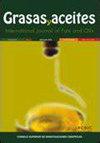Development and characterization of ethanol-free spearmint essential oil nanoemulsion for food applications using the low energy technique
IF 1.1
4区 农林科学
Q4 CHEMISTRY, APPLIED
引用次数: 2
Abstract
Different emulsifiable concentrates containing spearmint essential oil (SEO) were made and evaluated for their potential for giving ethanol-free nanoemulsion spontaneously upon dilution into water. Each one of these formulas had its specific composition regarding the type of excipients, surfactants, surfactant/SEO ratio and surfactant concentration. The results of this evaluation indicated that the chemical composition of SEO has a profound effect on the formation and physical stability of the nanoemulsion. The incorporation of excipients such as long chain triglyceride and propylene glycol into the emulsifiable concentrates at only 1.0% can lead to a stable nanoemulsion that resists Ostwald ripening. A particle size measurement showed that the diameter of SEO in the nanoemulsion was 28.2 nm and its nanostructure was maintained for 3 months. The application of a mixture of binary nonionic food-permitted surfactants enhanced the thermal stability of the nanoemulsion at up to 50 ᵒC. The developed ethanol-free SEO nanoemulsion has promising industrial applications in food and beverage flavoring.利用低能技术开发和表征食品用无乙醇留兰香精油纳米乳液
制备了含有留兰香精油(SEO)的不同乳油,并评估了它们在稀释到水中后自发产生无乙醇纳米乳液的潜力。这些配方中的每一种都有其关于赋形剂类型、表面活性剂、表面活性素/SEO比率和表面活性剂浓度的特定组成。该评价结果表明,SEO的化学组成对纳米乳液的形成和物理稳定性有着深远的影响。将赋形剂如长链甘油三酯和丙二醇仅以1.0%的比例掺入可乳化浓缩物中,可以产生稳定的纳米乳液,从而抵抗奥斯特瓦尔德熟化。粒度测量显示纳米乳液中SEO的直径为28.2nm,并且其纳米结构保持3个月。二元非离子食品表面活性剂混合物的应用提高了纳米乳液的热稳定性,最高可达50ᵒC.所开发的无乙醇SEO纳米乳液在食品和饮料调味品中具有很好的工业应用前景。
本文章由计算机程序翻译,如有差异,请以英文原文为准。
求助全文
约1分钟内获得全文
求助全文
来源期刊

Grasas y Aceites
工程技术-食品科技
CiteScore
2.50
自引率
0.00%
发文量
50
审稿时长
3 months
期刊介绍:
Grasas y Aceites is a peer-reviewed journal devoted to the publication of original articles concerning the broad field of lipids, especially edible fats and oils from different origins, including non acyl lipids from microbial origin relevant to the food industry. It publishes full research articles, research notes, reviews as well as information on references, patents, and books.
Grasas y Aceites publishes original articles on basic or practical research, as well as review articles on lipid related topics in food science and technology, biology, (bio)chemistry, medical science, nutrition, (bio)technology, processing and engineering. Topics at the interface of basic research and applications are encouraged. Manuscripts related to by-products from the oil industry and the handling and treatment of the wastewaters are also welcomed.
Topics of special interest to Grasas y Aceites are:
-Lipid analysis, including sensory analysis
-Oleochemistry, including lipase modified lipids
-Biochemistry and molecular biology of lipids, including genetically modified oil crops and micro-organisms
-Lipids in health and disease, including functional foods and clinical studies
-Technical aspects of oil extraction and refining
-Processing and storage of oleaginous fruit, especially olive pickling
-Agricultural practices in oil crops, when affecting oil yield or quality
 求助内容:
求助内容: 应助结果提醒方式:
应助结果提醒方式:


